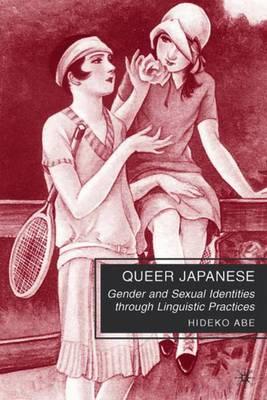Overview
Abe presents a comprehensive picture of the linguistic strategies employed by Japanese sexual minorities in various social contexts, from magazine advice columns to bars to text messaging on cell phones to private homes.
Full Product Details
Author: H. Abe
Publisher: Palgrave Macmillan
Imprint: Palgrave Macmillan
Dimensions:
Width: 14.00cm
, Height: 1.10cm
, Length: 21.60cm
Weight: 0.395kg
ISBN: 9780230622364
ISBN 10: 0230622364
Pages: 199
Publication Date: 14 April 2010
Audience:
Professional and scholarly
,
Professional & Vocational
Format: Hardback
Publisher's Status: Out of Print
Availability: Awaiting stock

Reviews
Queer Japanese is a treasure trove of information about the language practices - and language attitudes - of sexual minority speakers of Japanese, an understudied group of speakers, who are critically important to a realistic understanding of the gendered qualities of Japanese, a language that is typically bracketed off in cross-linguistic research as 'unique' in having 'separate languages' for (heterosexual, heteronormatively aligned) women and men. As with many treasure troves, the reader will find in this volume an untold wealth of information and much food for thought. - The Journal of Asian Studies
<p>“Based on extensive empirical research, Abe explores how sexual minorities in Japan use language as a resource for negotiating and constructing diverse roles and identities in specific socio-cultural contexts. The focus on marginalized speakers serves to illuminate the Japanese hegemonic gender and sexuality structure, and help us deepen our understanding of the complex relationship between language, ideology, and social meanings. The book is clearly written and the conclusions are well supported by intriguing and rich data. Abe’s work represents a much needed and superb addition to the field.”—Shigeko Okamoto, Professor and Chair, Language Program, UC Santa Cruz<p> <p>“Abe forces us to transcend narrow models of Japan’s linguistic landscape with her richly detailed and ethnographically grounded account of the language resources used by sexual minorities. This timely and innovative book provides a much needed perspective o
<p> Based on extensive empirical research, Abe explores how sexual minorities in Japan use language as a resource for negotiating and constructing diverse roles and identities in specific socio-cultural contexts. The focus on marginalized speakers serves to illuminate the Japanese hegemonic gender and sexuality structure, and help us deepen our understanding of the complex relationship between language, ideology, and social meanings. The book is clearly written and the conclusions are well supported by intriguing and rich data. Abe's work represents a much needed and superb addition to the field. --Shigeko Okamoto, Professor and Chair, Language Program, UC Santa Cruz<p> <p> Abe forces us to transcend narrow models of Japan's linguistic landscape with her richly detailed and ethnographically grounded account of the language resources used by sexual minorities. This timely and innovative book provides a much needed perspective on the role of language in identity construction, taking us past worn stereotypes to an appreciation of the diversity found among lesbian, gay, bisexual, transgender and transsexual speakers. --Laura Miller, Past President, Society for East Asian Anthropology and author of Beauty Up: Exploring Contemporary Japanese Body Aesthetics
Author Information
HIDEKO ABE is Assistant Professor of Japanese in East Asian Studies Department at Colby College, USA.




